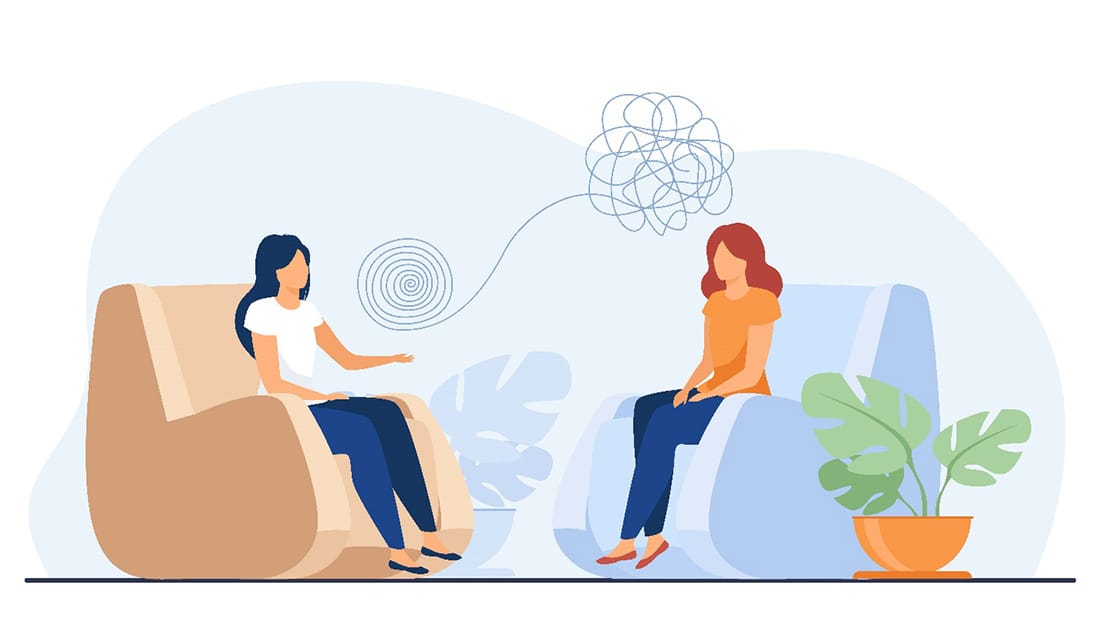It has been claimed in the past that women are twice as likely to suffer from depression as men. Factors may include anxiety caused by naturally-fluctuating female hormones, a work environment in Japan that still makes it difficult for women to work, conflicts arising from relationships within the family, or memories of childhood trauma. Compounding this, recent research suggests that women’s mental health has been further negatively impacted under the COVID-19 pandemic. If we suspect the mental health of someone close to us is deteriorating, whether in the family or at work, how should we go about responding?
In this newsletter, we speak to Dr. Yoshiko Orito of the Yoyogi no Mori Clinic, who has been involved in women’s mental health for many years, about the issues surrounding women’s mental health and specific measures to deal with them. Dr. Orito’s profile may be found at the end.
Hardworking women who are perfectionists may find themselves backed into a corner
Women’s mental health in particular has been deteriorating in recent years
It has been reported that one in four to six women will experience depression at least once during their life. Female-specific biological factors, such as the fluctuations in female hormone secretion over a woman’s lifetime (pre-menstrual, postpartum, menopause, etc.) and psychosocial burdens that women bear may all intertwine in a complex way to worsen symptoms associated with depression. Of course, men are affected by depression too, and their ‘culture of silence’ can mean they are more severely affected because they cannot bring themselves to speak up about their feelings.
A range of environmental factors for women have also been identified, such as a Japanese work environment that remains largely unsupportive of working women, changes in living conditions due to marriage and divorce, pressure to balance work and home life, marital conflicts, household chores and nursing care among others, that can all place a heavy additional burden on women.
(See previous newsletter on ‘The current state of women’s mental health in Japan’ here).
A notable global decline in women’s mental health since COVID-19
There have been reports of an increase in the number of suicides among women in Japan since the COVID-19 pandemic 1, with further data to suggest that women’s mental health is worsening. To give some context to this, many female workers in Japan are in non-regular employment with unstable income and tenure. Industries such as tourism and catering, which have a high proportion of female workers, were also hit hard by the pandemic with many women suffering decreased income or losing their jobs entirely, which will have had a significant impact on their mental health.
Another differentiating point to consider is that whereas men tend to internalize social pressure to pursue self-help, women may find a greater sense of security through their connections with others. Many of the patients we’ve seen at our clinic have refrained from non-essential outings since the pandemic began, instead working remotely, refraining from eating out, not seeing distant relatives and friends, and ultimately feeling more isolated, which results in mental and physical illness. We’ve also seen differences in opinion within family members regarding measures against COVID-19, as well as women feeling exhausted by all the associated extra disinfection measures, since they feel obligated to protect the health of their whole family.
However, the pandemic has not necessarily only brought about negative consequences. Many people have actually reported increased levels of communication among family members, with a sense of security and better rapport. According to a domestic survey, around 20% of respondents said that their marriages had improved as a result of extended home time together, which is more than twice as many as those who said that their marriages had worsened 2. It is precisely at times like this that it is important for both parties to work together and regularly communicate their feelings in small bite sizes. On the other hand, some respondents noted that increased time spent at home with husbands and family members who consider household chores including lunch preparation to be a woman’s job has increased their burden 3. There are also more conflicts and disagreements within the family and, unfortunately, reports of domestic violence are also on the rise. Household chores such as cooking, laundry and cleaning can become too much for one person, so it is important to help each other by taking turns. If the other person is unable to do so because of work or other commitments, it is important to recognize their efforts and still say ‘thank you’ to each other.
A surprisingly large number of women suffer from memories of childhood trauma
How do symptoms of deteriorating mental health typically manifest in women?
Before menstruation, some women may feel depressed and more irritable towards those close to them. During periods of major changes in female hormone secretion, such as after childbirth or during the menopause, mental health can easily deteriorate, with symptoms such as difficulty sleeping, loss of appetite, lack of motivation, tiredness and blaming oneself for being negative may also appear. For some, this may also manifest as panic attacks (heart palpitations, shortness of breath and sweating that stem from anxiety or nervousness).
Do men and women have different mental health stressors?
For men, known stressors include overwork, employment transfers and interpersonal relationships at work. In contrast, for women, stressors typically include physical and mental health problems related to significant life stages such as pregnancy, childbirth, and menstruation, conflicts within the family (e.g., parents and husband), workplace relationships and pressure, in addition to overworking.
Moreover, memories of childhood trauma have been shown to also contribute to worsening mental health in adulthood. In particular, interviews conducted with female patients with depression have found that approximately 50% of women reported having experienced maltreatment (inappropriate behavior such as abuse or neglect directed by adults towards children). Different types of trauma, including violence, sexual abuse and neglect were recorded. At times of mental or physical vulnerability, these memories may return and interfere with daily life.
Creating a workplace where people can feel comfortable talking about mental health issues and take time off
What should people do if they suspect that a family member or colleague is suffering from mental health issues?
The first thing you should do is to notice the change. Listen to them carefully and understand their feelings. For example, pay extra attention to unusual behavior, such as a person who is not usually late suddenly being late, missing work more frequently, or making mistakes that he or she would not normally make. If you notice a typically sociable person starts to avoid social interaction with others, suddenly drinks more or complains of mental or physical illness, ask them, “Are you OK now?”; “Are you feeling overwhelmed?”; “Are you working too hard these days?” It is important to speak to them in a sympathetic manner, for example, “I understand” or “If you’re tired, I’ll help you.” On the other hand, seemingly encouraging words such as “Try harder!” or “Keep up the good work!” can just cause further stress. It is very important to treat the person with a supportive attitude and say, “You’ve done a great job so far.” However, for those who are blaming themselves irrationally and saying things like “I’m just a nuisance to others, I don’t have the self-confidence to do this anymore,” they may benefit from a little encouragement such as, “You’ve got this!” In my experience of working with women’s mental health for many years, I can tell you that mental health issues can happen to anyone. It’s important to create an environment that upholds the words, “It’s okay to rely on those around you.”
Mental health issues can also affect those who are socially active. When this happens, it’s important to take a break. In some cases, it may be necessary to take time off from work to concentrate on treatment. Rest properly, consult with others and receive treatment instead of holding it all by yourself. There are currently various treatments, and drug treatment is performed according to the individual, but the environment surrounding the patient and how they interpret events (cognition) also greatly affect the symptoms. It is essential to create an environment where they can rest at any time without worry, and where those who have recovered can return to work in the same workplace.
The following is a list of key points we give to help support patients and their families who choose to visit our clinic. I hope these will be useful examples:
- Understand the situation is tough and don’t blame them. It’s not a matter of laziness.
- Don’t simply tell them to “keep going!”. “Stay strong. Do your best!” and other such words from family members can actually be a burden. If they keep receiving encouragement after already pushing themselves to the mental and physical limit, they will end up blaming themselves, which will only make things worse.
- First and foremost, let them rest. If family members force going out or traveling for a change of pace, it may have the opposite effect and cause additional exhaustion.
- Postpone important decision-making. If they suddenly declare they want to quit their job or move to a new place, remain calm and say, “OK, let’s think about it when you’re feeling a little better.”
- Do not tiptoe around them – act naturally while remaining considerate.
- Don’t try too hard to identify a root cause of the symptoms.
- Instead of holding overly high hopes or despairing every time their symptoms change, observe them patiently.
What is your advice for relieving our own stress?
I recommend to avoid keeping your thoughts and feelings bottled up. Instead try to express them to others in small amounts. I recommend using ‘I’ messages (“I think…”) rather than ‘You’ messages (“You are…”). Another trick to keep yourself calm is the concept of “good enough”. Instead of forcing yourself to “be” such and such, remember to accept yourself as you are, rely on others at times, take a break when you are tired, and learn to live in moderation.
Finally, what message would you like to give to readers of this newsletter?
Unlike when I started providing mental health care for women more than 20 years ago, I feel that the barriers to accessing psychosomatic medicine or seeing a psychiatry department have been lowered. On the other hand, it is true that many people are still suffering from a lack of help. To eliminate the stigma (negative labels in society such as discrimination and prejudice) against psychiatric conditions, it is essential that families, companies, and society as a whole have a proper understanding of mental health. Deteriorating mental health is not easily understood because, unlike a broken bone, there is no outward change and, unlike diabetes, no abnormality is found in medical examination. Also, the more hard-working you are, the more likely you are to force yourself to act cheerful around others. If someone close to you shares their pain, first accept their feelings and listen to them. It is important to accept and empathize with their feelings, show them that there are places they can turn to, and encourage them to see a doctor when necessary. I hope that society will become a place where it is normal for people to be sympathetic toward those who are feeling vulnerable and listen to them, so that they do not have to feel isolated.
I hope that my story will help to improve the mental health of women and, by extension, the wellbeing of society as a whole.
|
Profile: Dr. Yoshiko Orito, MD Psychiatrist& Physician, Yoyogi no Mori Clinic |
||
|
Designated psychiatric health physician, psychiatrist, internist, and specialist at an outpatient clinic for women’s mental health. After graduating from Hyogo Medical University, Dr. Orito trained at Kobe University Hospital. She has been involved in women’s mental health for many years, including setting up an outpatient clinic for women’s psychosomatic medicine at Palmore Hospital and Kobe Kaisei Hospital. She then worked at the Tokyo Jikei University School of Medicine and Sobu Hospital before assuming her current position at the Yoyogi no Mori Clinic in May 2018. Dr. Yoshiko Orito’s “2021 Women’s Activity Promotion Project: Lecture on Mental Health for Working Women” can be viewed by visiting the Tokyo Douga link below, the official video channel of the Tokyo Metropolitan Government (Japanese-language): https://tokyodouga.jp/tts7u7eo8bs.html |
 |
If you are affected by mental health issues
Japanese links from the Ministry of Health, Labour and Welfare (MHLW):
- List of organizations offering online consultations:
https://www.mhlw.go.jp/stf/seisakunitsuite/bunya/hukushi_kaigo/seikatsuhogo/jisatsu/soudan_sns.html - Japan Suicide Countermeasures Promotion Center (JSCP):
https://jscp.or.jp/ - "Becoming a Gatekeeper” (Japanese):
https://www.mhlw.go.jp/stf/seisakunitsuite/bunya/hukushi_kaigo/seikatsuhogo/gatekeeper.html
Previous COSMO newsletters
- The current state of women’s mental health in Japan:
https://cosmopr.co.jp/en/the-current-state-of-womens-mental-health-in-japan-en/ - Spotlight on Women’s Health in Japan: The role of femtech in the lives of women:
https://cosmopr.co.jp/en/womens-health-in-japan-en/
https://www.npa.go.jp/safetylife/seianki/jisatsu/R04/R3jisatsunojoukyou.pdf
https://www.meijiyasuda.co.jp/profile/news/release/2021/pdf/20211115_01.pdf
https://www.metro.tokyo.lg.jp/tosei/hodohappyo/press/2021/09/24/13.html






